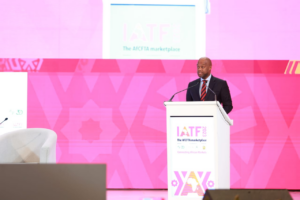
What does Afreximbank’s $1 Billion Transit Scheme Mean for Africa’s Cross-Border Trade Aspirations?
Guaranteeing Cross-Border Movement
The African private sector continues to make true its promise of owning and driving Africa’s continental free trade, particularly under the African Continental Free Trade Area (AfCFTA) agreement which seeks to create a single African market of 1.3 billion people. This follows a recent commitment by Afreximbank to spend $1 billion on the implementation of the African Collaborative Transit Guarantee Scheme (AACTGS) to eliminate border delays and reduce costs in cross-border trade. The AACTGS is aimed at facilitating the movement of goods across the continent’s borders without hindrance by effectively dismantling barriers that have long impacted trade due to over 110 national customs borders.
Africa’s private sector accounts for over 80% of the total production, two-thirds of investment, three-quarters of credit, and employs over 90% of the working-age population putting it in an ideal position to drive the success of intra-African trade and benefit it directly. Leading the charge, the design of the AACTGS by Afreximbank was geared at improving efficiency, shortening the time for border clearances, and promoting a seamless movement of goods across borders.
Cross-Border Trade Outlook in Africa
Africa’s economic growth and integration have long been hampered by high transportation costs and complex transit procedures. With transportation costs in African countries 63% higher than those in developed economies, and a staggering 135% higher than in Europe, the need for innovative solutions to promote intra-African trade has never been more urgent.
Transportation costs, including transit costs, have been a significant barrier to the competitiveness of African manufacturers and the development of regional and global value chains. Landlocked countries face additional challenges, as goods imported through countries with seaports must transit to multiple nations before reaching their final destination. These transit countries, wary of dutiable goods entering their markets, often require cumbersome guarantees, leading to delays and increased costs. This considering that the average cost of freight as a percentage of the total value of imposts is at 11.4% compared to 6.8% for developed countries.

Ultimately, the cost of importing and exporting goods has been a significant driver of higher cost of goods for consumers and manufacturers directly impacting the progress of cross-border trade in the continent. This not only affects the ability of nations to add value to natural resources as costs coupled with border delays impact the importation of intermediate foods affecting the competitiveness of the domestic producers relative to global payers. In addition, few regional economic communities are fully implementing, if any, their regional transit guarantee schemes with traders often required to post-national bonds at each and every border further inflating costs and causing delays.
The AACTGS Solution
Afreximbank’s AACTGS is a strategic initiative aimed at reducing bottlenecks associated with the movement of goods across borders within Africa. By providing transit guarantees directly or indirectly to eligible beneficiaries, the scheme assures customs authorities that they will recover import duties even if transit procedures face complications. The collaboration involves the African Union, Regional Economic Communities (RECs), customs authorities, financial institutions, and other stakeholders, targeting the harmonization of transit guarantee schemes across the continent.
The ultimate goal of AACTGS is to enable goods to move seamlessly within RECs and eventually across the entire continent under a single continental bond, in line with the African Continental Free Trade Agreement (AfCFTA). For instance, the framework will allow goods to move within regional integration communities under a single transit guarantees, such as within the EAC, and equally allow movement of goods from one REC to another, such as EAC to ECOWAS, under a single transit guarantee.
The scheme further covers direct issuance of guarantees to trade champions, export trading companies, and other stakeholders, along with offering counterparty guarantees to local financial institutions issuing transit bonds. Ultimately, the framework will eventually enhance inter-REC trade and lead to the free movement of goods throughout the AfCFTA region under a single continental bond to promote intra-African trade. This comprehensive approach aims to streamline transit procedures, reduce delays, and cut down on the costs associated with movement across borders.
Intervention Mechanisms and Benefits
The scheme defines customs transit as a procedure allowing goods to move under customs control from the departure to the final destination. Afreximbank, as a Pan-African financial institution, leverages its financial standing to issue regional or continental transit guarantees directly or indirectly. The purpose of the scheme is to support importers and exporters in moving goods without paying customs duties, eliminate the need for expensive national bonds, and facilitate the movement of goods throughout the African continent in alignment with AfCFTA objectives. While issuing a US$10 million transit bond for Zambia’s Innovate General Insurance (IGI) as the main beneficiary, Afreximbank projected saving the continent about US$300 million in transit costs with continued collaborations.
The AACTGS deploys various intervention instruments, including the transit guarantee, counterparty guarantees, advocacy, capacity building, advisory services, and financing of trade facilitation projects. These measures collectively aim to enhance the efficiency of transit operations, reduce delays, and contribute to the overall success of intra-African trade.
The benefits of AACTGS are wide-ranging, encompassing proper payment for customs duties, risk coverage for non-transit of goods, release of working capital, reduced congestion at borders, increased competitiveness, and business opportunities. Beneficiaries include export trading companies, authorized economic operators, intra-African trade champions, manufacturing companies, freight forwarders, clearing agencies, and reputable financial institutions.
The Afreximbank-African Collaborative Transit Guarantee Scheme represents a pivotal step towards realizing the dream of a single continental market in Africa. By addressing the challenges posed by high transportation costs and complex transit procedures, the scheme not only facilitates intra-African trade but also positions the continent as a competitive player in the global market. As African nations come together under the AfCFTA, the AACTGS stands as a testament to the transformative power of collaborative initiatives in unlocking Africa’s economic potential.
Muoki Musila is an Kenyan based economist. These are the writer’s own opinions and do not necessarily reflect the viewpoints of Liberty Sparks. Do you want to publish in this space? Contact our editors at [email protected] for further clarification.



